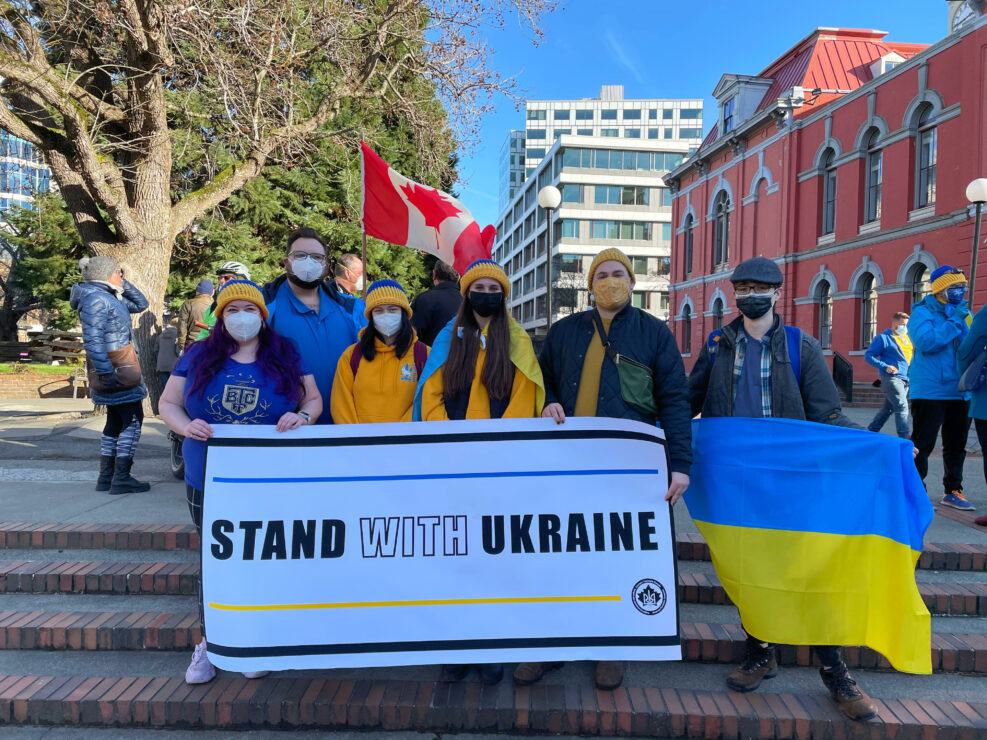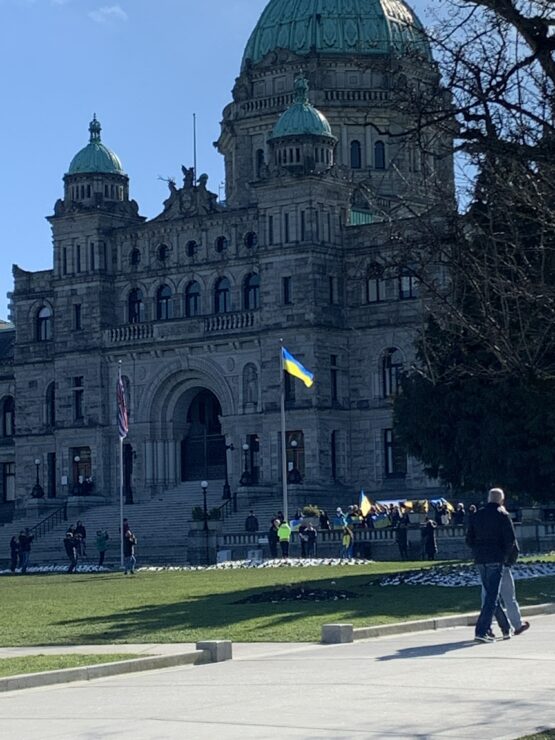People across the UVic and Greater Victoria communities show their support

On Sunday, Feb. 6, a small crowd of people dressed in yellow and blue gathered in Centennial Square in solidarity and support of Ukrainian sovereignty. The rally was part of #StandWithUkraine, a social media campaign that led to over 30 in-person rallies that day in Canada alone. Among those showing their support were members of the UVic Ukrainian Students’ Society (UVicUSS).
On that day, the campaign and the UVicUSS were responding to an excess of Russian troops along the Ukraine-Russia border.
At the rally with the UVicUSS was their Past-President Devon Sereda Goldie. “It’s been really inspiring to see Ukrainians around the world coming together to really advocate for the country,” said Sereda Goldie in an interview a couple days after the rally.
Sereda Goldie is a Master’s student at UVic who, like many members of the UVicUSS, has strong ties to Ukraine. Not only does she work for the Ukrainian Canadian and Ukrainian World Congresses, but she also has friends and family in the country.
“It’s very anxiety-producing because, of course, absolutely no one wants to see this end in bloodshed,” Sereda Goldie said about the increased aggression.
Although at the time of the rally, Russia insisted that the build-up of forces was for the purpose of training routines, members of the club and participants of #StandWithUkraine were preparing for the worst and asking international governments to do the same.
Sereda Goldie made it clear that they were seeking support rather than direct intervention from Canada. “We are not expecting Canada or any other country to come in and fight for Ukraine … what we’re asking Canada to provide is defensive capabilities.”
The actions of support desired by Sereda Goldie and others included providing defensive weapons, supporting Ukraine in acquiring a plan for membership with the North Atlantic Treaty Organization (NATO), and continuing Operation UNIFIER, which assists with military training in Ukraine.
“Even for us here in Canada that aren’t directly impacted by this, I think this really matters,” said Sereda Goldie. “If Russia goes ahead and invades, it’s going to be a big step backwards in terms of international relations and politics and peacekeeping.”
On the night of Feb. 23, their worst fears were realized as news of an invasion slowly began to break. A series of attacks occurred across Ukraine shortly after Russian President Vladimir Putin announced a “special military operation” in the country.
Sereda Goldie describes the night as surreal. It began with a Ukrainian Canadian Congress national board meeting. Sereda Goldie and Ukrainians across the country were on the call along with Prime Minister Justin Trudeau and several cabinet ministers. They discussed Canada’s plan in the event of an invasion, including the refugee crisis that would follow.
About half an hour after the meeting ended, news broke that Russia had invaded Ukraine. Sereda Goldie was at a close friend’s house at the time.
“We just sat there watching the news, feeling incredibly overwhelmed,” Sereda Goldie said. She describes the emotions as incredibly heavy and stressful.
Despite the emotional weight and the tears shed that night, she quickly pivoted her focus to take action.
“Ever since we’ve kind of hit the ground running as a community, and I haven’t really stopped,” Sereda Goldie said. “I’ve been running around every minute of every day trying to get things organized and trying to provide as much support as we can.”
Alisha Gajjar-Fleming is a UVic graduate student studying the conflict between Russia and Ukraine, specifically the war in Donbas.
“Some of the footage that’s been coming out of Ukraine has been incredibly tough to watch,” said Gajjar-Fleming. “When I see these images, the only reference point I really have is World War II movies. It doesn’t seem like something that should be happening in today’s day and age.”
Since the initial invasion on Feb. 23, hundreds of people have died and the country has seen a dramatic increase in the number of internally displaced persons as well as refugees attempting to flee the country.
Putin claims the attacks serve to protect Russian speakers in Ukraine from aggression and to “denazify” the country.
According to Gajjar-Fleming, “It’s all part of this narrative that he’s saving and reunifying the Russian nation.” The initial escalation in military presence and subsequent invasion came as Ukraine gets closer to joining the EU, threatening Putin’s goal of reunification.
It’s also possible the invasion is motivated by Putin’s desire to increase his political popularity. Gajjar-Fleming says that his approval ratings are known to go up whenever he launches a war.

Though the exact motivation and reason for the timing of the attacks are unknown, many experts were not surprised.
“I was shocked, but I wasn’t surprised,” said Gajjar-Fleming. “I think that’s what a lot of people who have one eye on that situation have been feeling. Obviously it’s shock and horror, but it’s also not surprise because Ukraine has been territorially occupied for the past eight years.”
Despite the lack of surprise and long history of the conflict, the past month has been emotional for those with ties to Ukraine, including members of the UVicUSS like Sereda Goldie.
“Every day for the past few years, there’s been articles about some young person that’s died on the front line. And it’s always really emotional for me,” Sereda Goldie said. She is grateful for the emotional support provided by the club.
“There’s not much that we can do beyond just trying to support each other emotionally and be there for one another, but I really appreciate that,” Sereda Goldie said. “I appreciate being able to have a group of people who know what’s going on and that I can go talk to, and I imagine the others do as well.”
In addition to participating in #StandWithUkraine and supporting each other, the UvicUSS is also helping Ukrainians on the ground. Since the Feb. 6 rally, members have been selling handmade blue and yellow knit hats. The club is donating the proceeds to the Ukraine Humanitarian Fund.
The UVicUSS is not the only community on campus responding to the conflict in Ukraine.
According to Gajjar-Fleming, there has been a sense of solidarity within the Germanic and Slavic Studies department. Although the department consists of Russians, Ukrainians, Germans, and Canadians, “everyone is very much on the same page,” said Gajjar-Fleming. “We think the war is wrong, and we’re trying to help where we can.”
The department voiced this support publicly with a statement on social media. “Standing in solidarity with our Ukrainian and Ukrainian-Canadian colleagues, students, and community members,” reads the post. It also linked to three organizations that are accepting donations.
UVic put out a similar message on Feb. 24, following the invasion. The statement expressed concern for affected community members and provided links to various support resources.
On March 2, the Germanic and Slavic Studies department also participated in a virtual teach-in. Dr. Serhy Yekelchyk, an expert on Ukrainian and Russian politics from the department, took part in the panel discussion. The event was held in hopes of combating the misinformation swirling around the internet.
The discussion covered how to find reliable information on the topic and how to support the Ukrainian community during this time.
Support has also extended beyond the UVic community and into Greater Victoria.
Sereda Goldie met with MP Laurel Collins on behalf of the Ukrainian Canadian Congress Victoria Branch to discuss the community’s needs. Some of the actions discussed were tougher sanctions on Russia and support for refugees. In response, MP Collins encouraged those in need of consular services to contact her office directly.
Since the first #StandWithUkraine rally, some of the community’s initial requests have also been met.
Canada has extended Operation UNIFIER and donated over $25 million worth of weapons and equipment. Economic sanctions have also been placed on a number of members of the Security Council of the Russian Federation, and select Russian banks have been cut off from The Society for Worldwide Interbank Financial Telecommunication (SWIFT).
Gajjar-Fleming is glad to see these concrete actions from the Canadian and other Western governments. When the invasion first happened, she felt that responses were focused more on sending thoughts and prayers than firm actions of support. “I worried that perhaps the West wasn’t taking it seriously, but now it seems that we are.”
While Sereda Goldie is also happy with the steps taken by the Canadian government so far, she is still calling for more action. A no-fly zone over Ukraine and a full trade embargo on Russia are some of the measures Sereda Goldie and the Ukrainian Canadian Congress are advocating for.
On Feb. 27, three weeks after the initial rally attended by the UVicUSS, downtown Victoria was once again filled with yellow and blue. This time, thousands gathered at the BC Legislature in solidarity. Once again, the UVicUSS joined their fellow community members to show support.
Sereda Goldie, Dr. Yekelchyk of the Germanic and Slavic studies department, and MP Collins all spoke at the event.
“I have been truly touched by the love and generosity of this community over the past three days,” Sereda Goldie said in her speech on the front steps of the legislative building, wearing the Ukrainian flag across her shoulders. “Please continue to support Ukraine as this war moves forward, and please continue to advocate for Ukraine.”
Behind her, a young child held up a yellow sign that read “Pray for Ukraine.”







